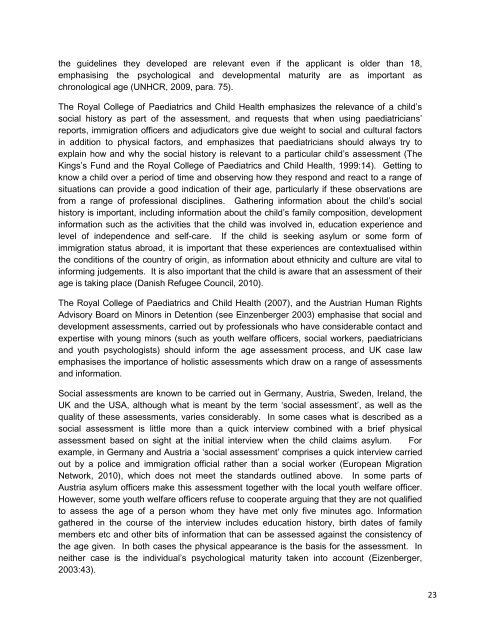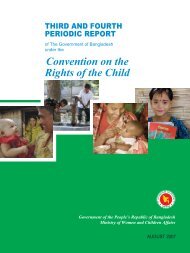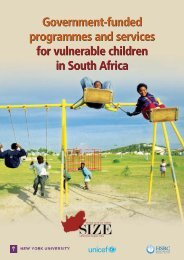Age assessment practices: a literature review & annotated ... - Unicef
Age assessment practices: a literature review & annotated ... - Unicef
Age assessment practices: a literature review & annotated ... - Unicef
You also want an ePaper? Increase the reach of your titles
YUMPU automatically turns print PDFs into web optimized ePapers that Google loves.
the guidelines they developed are relevant even if the applicant is older than 18,<br />
emphasising the psychological and developmental maturity are as important as<br />
chronological age (UNHCR, 2009, para. 75).<br />
The Royal College of Paediatrics and Child Health emphasizes the relevance of a child‟s<br />
social history as part of the <strong>assessment</strong>, and requests that when using paediatricians‟<br />
reports, immigration officers and adjudicators give due weight to social and cultural factors<br />
in addition to physical factors, and emphasizes that paediatricians should always try to<br />
explain how and why the social history is relevant to a particular child‟s <strong>assessment</strong> (The<br />
Kings‟s Fund and the Royal College of Paediatrics and Child Health, 1999:14). Getting to<br />
know a child over a period of time and observing how they respond and react to a range of<br />
situations can provide a good indication of their age, particularly if these observations are<br />
from a range of professional disciplines. Gathering information about the child‟s social<br />
history is important, including information about the child‟s family composition, development<br />
information such as the activities that the child was involved in, education experience and<br />
level of independence and self-care. If the child is seeking asylum or some form of<br />
immigration status abroad, it is important that these experiences are contextualised within<br />
the conditions of the country of origin, as information about ethnicity and culture are vital to<br />
informing judgements. It is also important that the child is aware that an <strong>assessment</strong> of their<br />
age is taking place (Danish Refugee Council, 2010).<br />
The Royal College of Paediatrics and Child Health (2007), and the Austrian Human Rights<br />
Advisory Board on Minors in Detention (see Einzenberger 2003) emphasise that social and<br />
development <strong>assessment</strong>s, carried out by professionals who have considerable contact and<br />
expertise with young minors (such as youth welfare officers, social workers, paediatricians<br />
and youth psychologists) should inform the age <strong>assessment</strong> process, and UK case law<br />
emphasises the importance of holistic <strong>assessment</strong>s which draw on a range of <strong>assessment</strong>s<br />
and information.<br />
Social <strong>assessment</strong>s are known to be carried out in Germany, Austria, Sweden, Ireland, the<br />
UK and the USA, although what is meant by the term „social <strong>assessment</strong>‟, as well as the<br />
quality of these <strong>assessment</strong>s, varies considerably. In some cases what is described as a<br />
social <strong>assessment</strong> is little more than a quick interview combined with a brief physical<br />
<strong>assessment</strong> based on sight at the initial interview when the child claims asylum. For<br />
example, in Germany and Austria a „social <strong>assessment</strong>‟ comprises a quick interview carried<br />
out by a police and immigration official rather than a social worker (European Migration<br />
Network, 2010), which does not meet the standards outlined above. In some parts of<br />
Austria asylum officers make this <strong>assessment</strong> together with the local youth welfare officer.<br />
However, some youth welfare officers refuse to cooperate arguing that they are not qualified<br />
to assess the age of a person whom they have met only five minutes ago. Information<br />
gathered in the course of the interview includes education history, birth dates of family<br />
members etc and other bits of information that can be assessed against the consistency of<br />
the age given. In both cases the physical appearance is the basis for the <strong>assessment</strong>. In<br />
neither case is the individual‟s psychological maturity taken into account (Eizenberger,<br />
2003:43).<br />
23
















